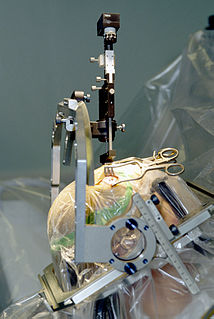
Neurosurgery or neurological surgery, known in common parlance as brain surgery, is the medical specialty concerned with the surgical treatment of disorders which affect any portion of the nervous system including the brain, spinal cord and peripheral nervous system.
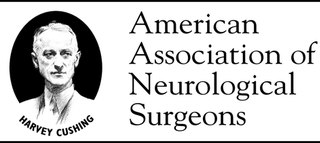
The American Association of Neurological Surgeons (AANS) is a scientific and educational association focused on advancing the specialty of neurological surgery. The organization has over 8,000 members around the world. It is one of the five Continental Associations of the World Federation of Neurosurgical Societies (WFNS), the other four being the AASNS, CAANS, EANS and FLANC.
Brian T. Andrews is a neurosurgeon specializing in pediatric neurosurgery, minimally invasive spinal surgery, brain tumors, neuro-oncology, neurotrauma, spinal stenosis and general neurosurgery. He is chairman of the Department of Neurosciences at California Pacific Medical Center and a founder of the California Pacific Neuroscience Institute.

Gail Linskey Rosseau is Clinical Professor of Neurosurgery at George Washington University School of Medicine and Health Sciences, Washington, D.C. Prior to this position, she was Associate Chairman of Inova Fairfax Hospital Department of Neurosciences. She previously served as director of skull base surgery of NorthShore University HealthSystem. She is board-certified and has been an examiner for the American Board of Neurological Surgery. She has been elected to the leadership of the American Association of Neurological Surgeons, World Federation of Neurosurgical Societies, and the Société de Neurochirurgie de Langue Française.

The Congress of Neurological Surgeons (CNS) is a professional association representing neurosurgeons, neurosurgical residents, medical students, and allied health professionals.
Albert Loren Rhoton Jr., was an American neurosurgeon and a professor specializing in microsurgical neuroanatomy. He developed and introduced a number of microsurgical techniques that improved the safety and effectiveness of neurosurgery, including the use of the surgical microscope in neurosurgery. He also designed many of the commonly used of microneurosurgical instruments, which bear his name. Such tools in use worldwide include the Rhoton Micro Dissectors designed for delicate work in the treatment of brain aneurysms and tumor resection.
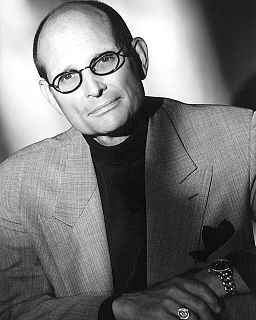
Michael L. J. Apuzzo is an American academic neurological surgeon, the Edwin M. Todd/Trent H. Wells, Jr. Professor Emeritus of Neurological Surgery and Radiation Oncology, Biology, and Physics at the Keck School of Medicine, of the University of Southern California. He is also editor emeritus of the peer-reviewed journals World Neurosurgery and Neurosurgery. He is distinguished adjunct professor of neurosurgery at the Yale School of Medicine, distinguished professor of advanced neurosurgery and neuroscience and senior advisor, at the Neurological Institute, Wexner Medical School, The Ohio State University, and adjunct professor of neurosurgery, Weill Cornell Medicine, Department of Neurological Surgery & Weill Cornell Brain and Spine Center.
Frank Henderson Mayfield, was an American neurosurgeon and founder of the Mayfield Clinic and Spine Institute in Cincinnati, Ohio. A pioneer in brain and spine surgery, he invented the spring aneurysm clip and the Mayfield skull clamp. Mayfield is best known for his clinical interests in peripheral nerve and spine injuries, development of neurosurgical instruments, and medical politics.
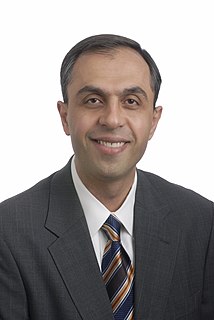
Aaron A. Cohen-Gadol is a professor of neurological surgery in the department of neurosurgery at Indiana University School of Medicine and a neurosurgeon at Indiana University Health specializing in surgical treatment of brain tumors and aneurysms. He performs removal of complex brain tumors via endoscopic techniques, which use the nasal pathways instead of opening the skull.

The Council of State Neurosurgical Societies is a professional body and an American surgical society created in 1976 to provide a national forum for the State Neurosurgical Societies of the United States of America. As a forum for practicing neurosurgeons, it focuses primarily on discussion, consideration, and proposals of action regarding socioeconomic issues concerning neurological surgery. The CSNS is composed of active neurosurgeons which are members of the various state neurosurgical societies in the ratio of 1 representative per 50 state society neurosurgeon members. The Presidents of the AANS and CNS appoint members/delegates to the CSNS in addition to the state designated delegates and 13 neurosurgery residents are elected as delegates from the four Quadrants with one selected from the Armed Services. The Council meets twice a year just before the annual meetings of the AANS and the CNS during which it considers resolutions submitted by delegates or its committees and receives reports from those committees as well as the AANS and CNS. Resolutions that are adopted by assembly vote are sent to the AANS/CNS for consideration and potential implementation.
Eben Alexander Jr (1913–2004) was an American academic neurosurgeon and a native of Knoxville, Tennessee. He is known for his notable education and training of neurosurgeons, his many recognition awards, and for his editorship of Surgical Neurology — An International Journal of Neurosurgery and Neuroscience from 1987 to 1994.

Jacob Chandy was an Indian neurosurgeon and teacher of medical sciences. As the first neurosurgeon in India, he is widely regarded as the father of modern neurosurgery in India. In 1964, the Government of India honoured him with their third highest civilian award, Padmabhushan, for his services in the fields of neurosurgery and medical education.
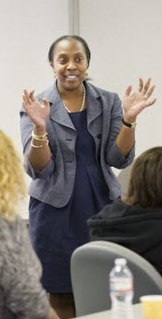
Odette Harris is a professor of neurosurgery at Stanford University and the Director of the Brain Injury Program for the Stanford University School of Medicine. She is the Deputy Chief of Staff, Rehabilitation at the VA Palo Alto Health Care System.
Charles Anthony Fager was born in Nassau, Bahamas, British West Indies. He had a long career as a neurosurgeon in the United States.
Ricardo Jorge Komotar is an American neurosurgeon who specializes in the field of brain tumors. He serves as director of the University of Miami Brain Tumor Initiative, director of the UM Neurosurgery Residency Program, and director of the UM Surgical Neurooncology Fellowship Program.
Nelson M. Oyesiku is a Nigerian-born professor of neurosurgery and Endocrinology. Currently, he is the chair of the department of Neurological Surgery and Professor of Medicine (Endocrinology) at the University of North Carolina, Chapel Hill, USA. Previously, he served as the director of the Inaugural Daniel Louis Barrow Chair in Neurosurgery, and Vice-Chairman, Department of Neurological Surgery, and Director of the Neurosurgical Residency Program at the Emory University School of Medicine. He was also the Director of Laboratory and Molecular Neurosurgery and Biotechnology at Emory University School of Medicine.

Dr. Basant Kumar Misra is a neurosurgeon specialising in treating brain, spine, cerebrovascular and peripheral nervous system disorders, injuries, pathologies and malformations. He is the vice-president of the World Federation of Neurosurgical Societies, and the former President of the Asian Australasian Society of Neurological Surgeons, and the Neurological Society of India. He is a recipient of Dr. B. C. Roy Award, the highest medical honour in India.
Edward Sander Connolly Jr. is an American neurosurgeon.
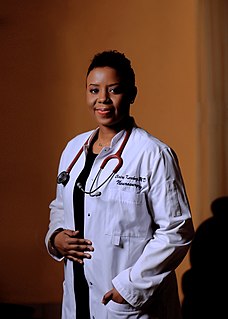
Claire Karekezi is a Neurosurgeon at the Rwanda Military Hospital in Kigali, Rwanda. As the first woman neurosurgeon in Rwanda, and one of six neurosurgeons serving a population of 13 million, Karekezi serves as an advocate for women in neurosurgery. She has become an inspiration for young people pursuing neurosurgery, particularly young women.
Deborah L. Benzil is an American neurosurgeon specializing in brain and spine tumors, stereotactic radiosurgery, socioeconomic education. She was awarded the Anthony Greto Fellowship from the Association of Brain Tumor Research. She is the Vice Chair and professor of neurosurgery at the Cleveland Clinic in Cleveland, Ohio, USA.










